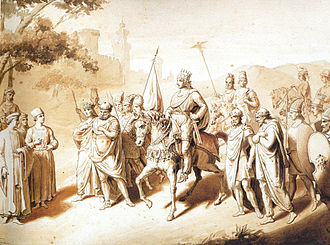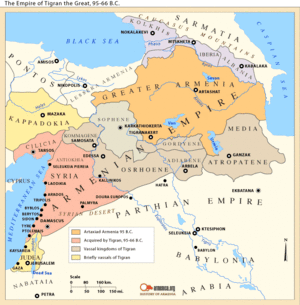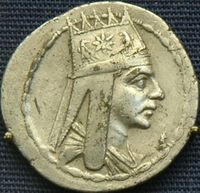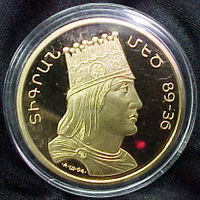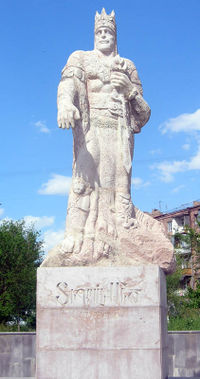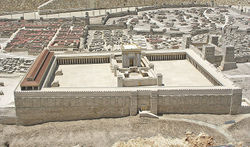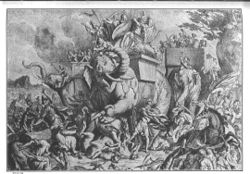Category:Tigranes the Great (subject)
|
Tigranes the Great / Armenian Invasion
Tigranes the Great, in history, literature and the arts Under Tigranes' leadership, Armenia became for a short time the strongest empire in the Middle East and a menace to Roman power in the region. At its height, the Armenian Empire included the regions of Media, Assyria, Cappadocia, Cilicia, Syria, Phoenicia, and Palestine. Tigranes took the title "King of Kings" for himself and ruled as a new Nebuchadnezzar, surrounded by the deposed kings who had to serve him. The beginnings of Tigranes' rule, however, were very hard. In his youth he lived hostage at the court of the Parthian King Mithridates the Great. Only around 95 BCE he bought back his freedom by handing over “seventy valleys” to the Parthians. He rapidly built up an alliance with another ambitious and powerful neighbor, the King Mithridates of Pontus and married his daughter Cleopatra. In 88 BCE, at the death of King Mithridates II of Parthia, Tigranes took advantage of the weakness of the Parthian empire to expand his influence in the East. He went so far as to attack the Parthian capital Ecbatana and looted it around. After concluding successfully his military campaign in the East, Tigranes, who now could legitimately bear the Parthian title of “King of Kings,” around 83 BCE moved westwards, conquering the Seleucid empire, Syria and Cilicia. He moved the capital of his empire from Artashat in Armenia to the newly founded city of Tigranocerta, that he populated by deporting inhabitants from the conquered lands. He then pushed south conquering Phoenicia. In 69 BCE he reached and besieged the seacoast city of Ptolomais (Acca), the last Seluecid stronghold at the border with the Hasmonean kingdom. The other populations of the region, including the Hasmonean kingdom, quickly submitted to the invader. But when the victory over Ptolomais opened the path to the conquest of Judea and Egypt, the Romans intervened. Tigranes entered in conflict with the Romans. It happened that Mithridates of Pontus, his father-in-law and alley, had been defeated by the Romans and had sought asylum in Armenia. Tigranes refused to deliver him. Rome declared war and Tigranes was forced to withdraw his garrisons from Syria as the general Lucullus attacked the capital Tigranocerta. The campaigns of the Roman general Lucullus largely reduced Tigranes' power in the region. The empire Tigranes had created collapsed, the new capital had to be abandoned. Tigranes took refuge to the mountains of Armenia, yet still undefeated, in spite of the attempts by Lucullus to chase him. Tigranes ultimately surrendered to Pompey in 66 BCE, receiving in exchange permission to rule Armenia as an ally of Rome, until his death in 55/54 BCE. Tigranes and the Jews When in 69 BCE Tigranes' army moved south to Phoenicia, the Hasmonean Queen Salome Alexandra submitted and paid tribute, receiving only vague promises in return. After the taking of Ptolemais, Israel was next in line, facing imminent invasion, defenseless against Tigranes' army. Only the intervention of the Roman general Lucullus in Syria saved the Hasmonean State from total capitulation and forced Tigranes to withdraw. In an ironic reversal of fortune, two descendants of Queen Salome Alexandra, namely, Tigranes V (6-12 CE) and Tigranes VI (58-62 CE), would rule in the first century CE as Kings of Armenia and successors of that Tigranes the Great, who once was on the verge of destroying the Hasmonean kingdom and dynasty. Tigranes, in literature and the arts Tigranes might be the "Nebuchadnezzar" of the Book of Judith, whose invasion threatened the independence of the Judean State and was opposed only by the courage of a devout and strong widow (Judith = Salome Alexandra). In Armenia Tigranes has never ceased to be celebrated in the arts as a hero of national pride and independence. With the renewed independence of the Armenian Republic in 1991, the figue of Tigranes has gained, if possible, even more relevance in Armenian culture and public life. In 1991 the play “Agony of Tigranes the Great” (1991) staged at Yerevan by actor Vartan Garniki, based on a patriotic poem of Hovhannes Shiraz (1915-1984) was celebrated as one of a landmarks in the awakening of Armenian national pride. To Tigranes the Great the new State has dedicated a monumental statue at Yerevan, a golden coin (1999), and a stamp (2007). In the West, Tigranes knew a brief period of revival and popularity only at the turn of the eighteenth century. He was the protagonist of Il Tigrane, re d’Armenia / Tigranes, King of Armenia, a libretto written by Francesco Silvani in 1691 and revised by Carlo Goldoni in 1741. Between 1691 and 1766, the libretto was set to music by more than 20 composers, including Tomaso Albinoni, Antonio Vivaldi, Adolph Hasse, Christoph Gluck, Niccolò Piccinni, and others. The fictional story, however, focused on the love relationship between the Armenian king and his wife Cleopatra, the daughter of Mithridates, and did not contain any reference to the military campaign of Tigranes in Phoenicia and Judea. [NOTE – Contrary to what is often claimed, Il Tigrane; ovvero, L’egual impegno d’amore e di fede (Teatro San Bartolomeo, Naples, 1715) by Alessandro Scarlatti (with libretto of Domenico Lalli [pseud. for Sebastiano Biancardi]) does not deal with the same subject but with the sixth-century BCE Armenian King Tigranes. The same libretto was set to music by Tomaso Albinoni, under the title L’amor di figlio non conosciuto (Teatro Sant’Angelo, Venice 1715).] Related categories External links
Jewish Sources Josephus, Bel I 116 -- Salome Alexandra also prevailed with Tigranes, king of Armenia, who lay with his troops about Ptolemais, and besieged Cleopatra, by agreements and presents, to go away. Accordingly, Tigranes soon arose from the siege, by reason of those domestic tumults which happened upon Lucullus's expedition into Armenia. Josephus, Ant XIII 419-421 -- About this time news was brought that Tigranes, the king of Armenia, had made an irruption into Syria with five hundred thousand soldiers, and was coming against Judea. This news, as may well be supposed, terrified the queen (=Salome Alexandra) and the nation. Accordingly, they sent him many and very valuable presents, as also ambassadors, and that as he was besieging Ptolemais; for Selene the queen, the same that was also called Cleopatra, ruled then over Syria, who had persuaded the inhabitants to exclude Tigranes. So the Jewish ambassadors interceded with him, and entreated him that he would determine nothing that was severe about their queen or nation. He commended them for the respects they paid him at so great a distance, and gave them good hopes of his favor. But as soon as Ptolemais was taken, news came to Tigranes, that Lucullus, in his pursuit of Mithridates, could not light upon him, who was fled into Iberia, but was laying waste Armenia, and besieging its cities. Now when Tigranes knew this, he returned home. Josephus, Ant XIV 29 -- Pompey sent Scaurus into Syria, while he was himself in Armenia, and making war with Tigranes...
Armenian Sources Moses of Khoren (5th century writer, the father of Armenian history) -- [Tigranes] built temples, and in front of the temples he set up altars, ordering all the princes to offer sacrifices and worship. To this the men of the Barartuni family [a Jewish family according to Armenian sources] did not agree, and he cut off the tongue of one of them, called Asud, for dishonoring the images, but he did not torment [them] in any other way, for they agreed on eat [meat] from the king’s sacrifices and also pork, although they themselves did not sacrifice or worship. Therefore he deprived them of the command of the army, but he did not take away the office of aspect with the right of crowning. … Immediately thereafter [Tigranes] attacked Palestine to seek vengeance from Cleopatra [daughter] of Ptolemy for the crimes her son Dionysius against his own father. He took many captives from among the Jews and besieged the city of Ptolemais. But the queen of the Jews, Alexandra—also known as Messalina—who was the wife of Alexander (Jannaeus), son of John (Hyrcanus), son of Simon the brother of Judas Maccabaeus, and who at that time held the throne of the Jews, by giving him many presents turned him back. For he heard a report that a certain brigand called Vaykun [=Lucullus] was causing a tumult in Armenia, holding the inaccessible mountain that up to now is called Vaykunik after the name of the brigand.
|
Greek-Roman Sources Plutarch, Vita Luculli xiv 5-6 -- [5] ...Over Armenia there sits enthroned Tigranes, King of Kings, with forces which enable him to cut the Parthians off from Asia, transplant Greek cities into Media, sway Syria and Palestine, put to death the successors of Seleucus, and carry off their wives and daughters into captivity. [6] This king is a kingsman of Mithridates, his son-in-law... Plutarch, Vita Luculli xxi 3-5 -- [3] Now the sway of the Armenians was intolerably grievous to the Greeks. Above all else, the spirit of the king [i.e. Tigranes] himself had become pompous and haughty in the midst of his great prosperity. All the things which men most covet and admire, he not only had in his possession, but actually thought that they existed for his sake. [4] For though he had started on his career with small and insignificant expectations, he had subdued many nations, humbled the Parthian power as no man before him had done, and filled Mesopotamia with Greeks whom he removed in great numbers from Cilicia and from Cappadocia, and settled anew. He also removed from their wonted haunts the nomadic Arabians, and brought them to an adjacent settlement, that he might employ them in trade and commerce. [5] Many were the kings who waited upon him, and four, whom he always had about him like attendants or body-guards, would run on foot by their master's side when he rode out, clad in short blouses, and when he sat transacting business, would stand by with their arms crossed. This attitude was thought to be the plainest confession of servitude, as if they had sold their freedom and offered their persons to their master disposed for suffering rather than for service.
|
Pages in category "Tigranes the Great (subject)"
The following 7 pages are in this category, out of 7 total.
1
- Tigran the Great (1940 Armen), book
- Tigran B. yev Hrome (1940 Manandyan), book
- Тигран второй и Рим (1943 Manandyan), book (Russian ed.)
- Tigrane II & Rome (1963 Manandyan), book (French ed.)
- Hoard of Copper Coins of Tigranes the Great (1991 Bedoukian), book
- Roma - Armenia (1999 Mutafian), edited volume
